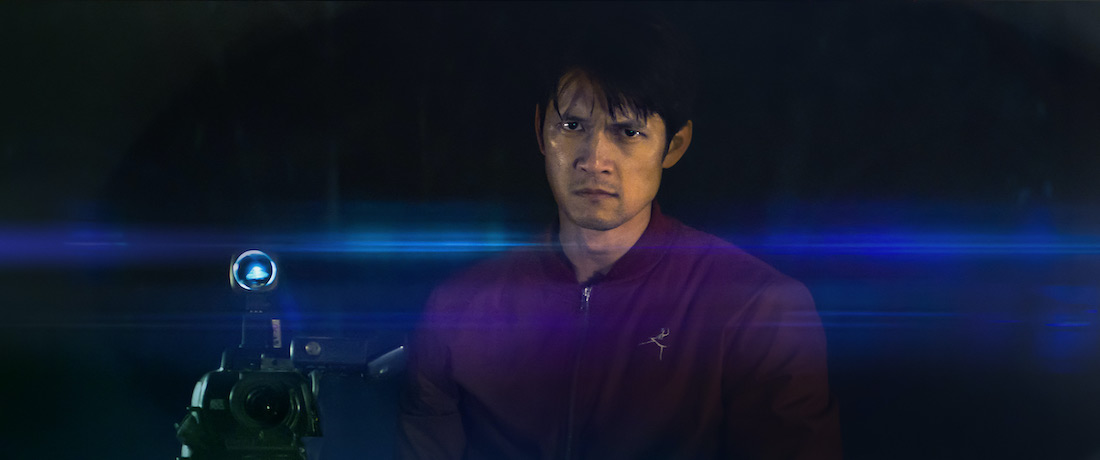In the late ‘80s, two TV broadcast hacks on Chicago stations created a bizarre mystery, in which the hackers—who displayed a masked guy based on Max Headroom, to go with their weird diatribe—were never found. It was so strong that it has inspired Midnighter title “Broadcast Signal Intrusion” from director Jacob Gentry, which imagines the same scenario as the beginning for sinister horror, and an obsessive investigation. Harry Shum Jr. stars as James, a video archivist, who comes across disquieting footage of people in white masks, mostly standing still, on something that looks like a set. It’s effectively ominous and creepy stuff.
The script from Tim Woodall and Phil Drinkwater plays out like a blockbuster adaptation of the Chicago incident, with added pieces that don’t all work. Kelley Mack initially enters the movie as Alice, an amiable stalker who prods her way into James’ investigation, but the character itself feels rather inconsequential, aside from how she gives the film’s main hunter someone to interact with. And in creating a narrative from this true, bizarre event, the crucial momentum isn’t always there. In the middle of the plot, right when it should be picking it up, it works less like a maze than a straight line with check points, leading to a long-winded monologue by of the script’s many suspicious characters. Sometimes the mystery is not as exciting as you want it to be, especially with the other promising features around it.
Though the movie is set in the late ‘90s, it’s built from the paranoia of the ‘70s and ‘80s, with James’ investigation recalling Francis Ford Coppola’s “The Conversation,” or split-diopter shots that make obvious nods to Brian De Palma. For good measure, there’s also tips to David Fincher’s grimy worlds in “Seven” and “Zodiac,” reflected here with this film’s Chicago environs. The ease to identifying this movie’s references are almost a fault, but it’s exciting to see Gentry use them for freaky riffing and with Shum Jr.’s raw performance leading the way. So long as it keeps us going from one strange revelation to the next, “Broadcast Signal Intrusion” works. And those masks are truly scary, long before James get more info about who is behind them.

There’s something mind-bogglingly unoriginal about “Offseason,” the latest movie from “Darling” and “Psychopaths” director Mickey Keating. The story, of a grieving daughter named Marie (Jocelin Donahue) traveling with her partner (Joe Swanberg) back to the ominous tourist destination island where her mother grew up, plays out exactly as you expect, it’s just been shot with more style than generic scripts are usually treated with. Even a standout actor like Richard Brake appears as The Bridge Man, but is most memorable for the unusual way that Keating’s camera frames him. With a movie as frustrating as this, I can’t tell if the filmmaking throws Keating’s script under the bus or if it truly saves the movie from being completely forgettable.
This is Keating’s venture into a “Wicker Man”-like cult horror, and yet his signature is only with style. The cinematography by Mac Fisken has the ability to suck you into its small world of conspiring residents and ominous symbols, to make you sit back and focus on the framing, or the distinct lighting. I loved a wide, disquieting shot overlooking a beach where the horizon cuts across like a painter’s broad stroke; the same goes for a nighttime argument between Marie and George that unfolds in front of their car’s blood-red brake light, the island’s stress further fraying their relationship. The best scenes in general are when Keating’s meticulous sense of shadows and composition are the star, though Donahue is a strong lead into navigating the island’s secrets.
But all that is intriguing about “Offseason,” at least as a strong audition to get Keating a “Silent Hill” project that someone else writes, makes it such a let-down. The script’s emotional core, of Marie understanding her mother’s relationship with the island, is washed away with the tropes: the creepy looking elderly people stand in the shadows, as they seem to always do in current horror, and the island’s residents are as generic as their action of going completely silent when Marie and George amble into their shadowy bar. Jump scares are included every now and then in clumsy fashion, with slow motion being used in the most unfortunate way. And whenever Keating nudges at the larger force we are meant to fear, the reason why we’re here, “Offseason” backfires. From start to finish, “Offseason” garners the “That’s it?” reactions that horror filmmakers and viewers alike dread.












